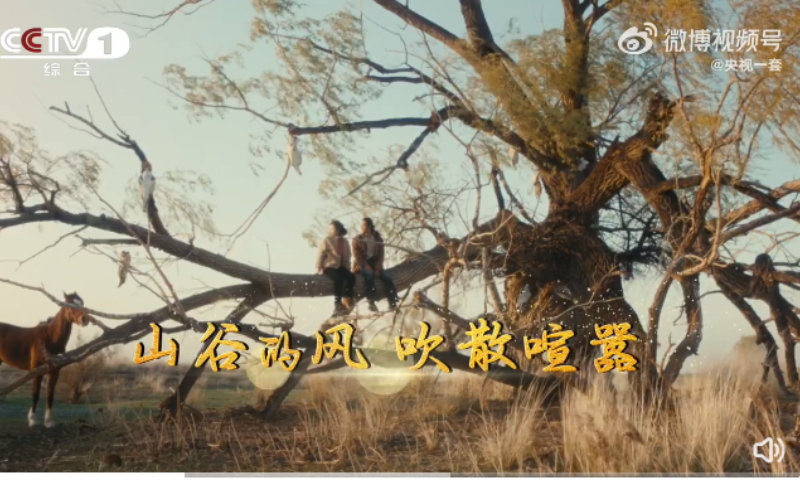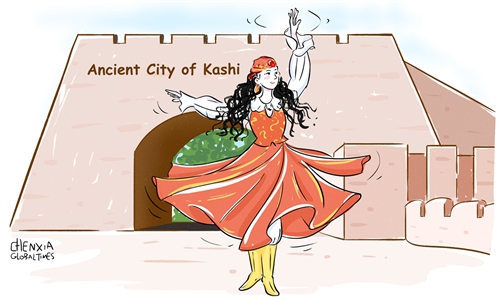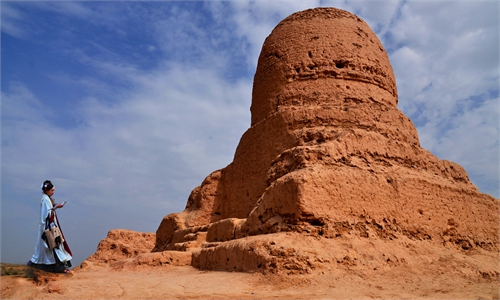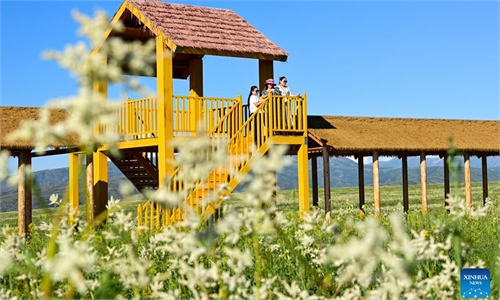
Screenshot of the trailer of To the Wonder Photo: Weibo account of CCTV
Tranquil grasslands and light blue skies in the borderlands of the northern part of Northwest China's Xinjiang Uygur Autonomous Region, the bits and pieces of the daily life of a Kazak village, the mother and daughter of Han ethnic group who integrate into the lives of herders … With its unique subject matter and pristine temperament, Chinese TV series To the Wonder, based on the adaptation of essays by author Li Juan, has stood out from many mind-twisting, meme-focusing time-travel and suspense dramas, becoming so far the highest-rated Chinese drama on Douban - a Chinese review website of movies and television series. Moreover, it shows a power that transcends ethnicity, geography and culture.
The drama has now entered the main competition section of the Cannes International Series Festival, and is starting to gain popularity abroad. Yet, with it comes polarized reactions. Organizers of the Canneseries have praised the series, saying that when walking into Xinjiang and the heartland of different ethnic groups, the viewers will be surprised by "the beauty of its shots, its innocent humor, its pace changes and the poetry at its core." However, some Western media, represented by the Wall Street Journal (WSJ), interpreted it differently. The WSJ published an article claiming that this show tries to give the Xinjiang region "a rosier image." It described the drama as a "propaganda push," saying its purpose was to "deny Western allegations of human-rights violations in Xinjiang."
It's no surprise that these Western media outlets feel overwhelmed by the reality of Altay. To the Wonder is completely different from the Xinjiang they have presented to the public, further tearing down the echo chamber they had hitherto created for Xinjiang. Instead of focusing on the advanced machinery in the cotton fields or the bustling markets of the capital city Urumqi, the drama focuses on the ordinary people of Xinjiang in the midst of China's economic development. It is filled with a harmonious atmosphere among all ethnic groups, which is reflected not only in the fact that the boundaries of the Kazak people are fully respected, but also in the fact that when the Han people become the "ethnic minority" of the village, they feel equally secure and at home with the other ethnic groups.
Altay is not a developed region in Xinjiang. Rather than saying that the drama "creates an image" for Xinjiang, it would be more accurate to say it portrays the real side of Xinjiang. The drama explains human rights and development in Xinjiang in another way. It does not emphasize government encouragement and support for ethnic minority areas but focuses on how people of all ethnic groups in Xinjiang enjoy equal development opportunities in the tide of the country's reform and opening-up. They have the right to choose their own way of life, and their movement is free. Regardless of success or failure, they have become participants in and shapers of contemporary Chinese social and economic life. The fate of ordinary people in Xinjiang is closely linked to the development of the country. This is both a story line and a fact, putting the Western lies of "forced labor" and "genocide" in an awkward position with no ground to stand on.
In the past, Western media often implied that China's ethnic policies were a failure when describing Xinjiang. However, Altay stands as a successful example of ethnic unity. The Altay region is home to over 30 ethnic groups, including Han, Kazak, Uygur, Mongolian, and Russian, and has generally maintained a harmonious and peaceful situation. The drama does not promote ethnic policies, but it authentically portrays scenes of mutual tolerance and warm affection between ethnic groups. It gives the world a direct view that, in Xinjiang, ethnic equality is a long-practiced, commonly accepted reality. Perhaps this is the main reason why it unsettles Western media; it demonstrates the advantage of China's ethnic policies and the system of regional ethnic autonomy and subtly showcases China's charm.
From a professional perspective, the reason To the Wonder resonates deeply and has gained popularity both in China and abroad is also due to the actors' dedicated performances and the beautifully shot scenes. Some Western media insist on politicizing it, which is completely irrelevant and absurd. Now, even the "land of beauty" is seen by the West as a new "propaganda tool" only because it allows outsiders to see the Chinese government's protection of minority homelands, respect, and tolerance for cultural diversity. This month, the drama will officially air in Kazakhstan, strengthening the ties between China and its neighbor and serving as a model of ethnic harmony and coexistence in the border regions of the two countries.
Of course, a single TV drama cannot fully reflect the whole picture of Xinjiang. However, compared to Western journalists who only focus on tarnishing China's image and have no real concern for the lives of Xinjiang residents, the memory of a female writer who spent nearly her entire childhood in Altay is apparently more credible. The popularity of To the Wonder might be just a coincidence, but the truth about Xinjiang's development will increasingly become known to the world.



